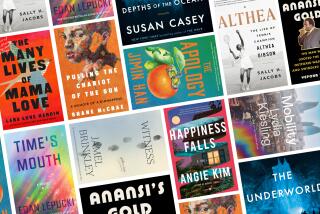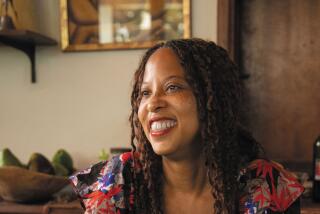After her epic debut novel on slavery’s descendants, Yaa Gyasi wrote even closer to home
If you buy books linked on our site, The Times may earn a commission from Bookshop.org, whose fees support independent bookstores.
At 28, Gifty, the narrator of Yaa Gyasi’s revelatory new novel, “Transcendent Kingdom,” thinks she’s figured things out. A sixth-year PhD candidate in neuroscience at Stanford University, she is studying the neural circuits of reward-seeking behavior. It is a path chosen, in large part, to make sense of the traumas of her childhood back in Alabama: the death of her beloved older brother, Nana, from opioid addiction and the crippling depression of their mother in its wake. For years, Gifty has kept people at a distance, more attached to lab mice than colleagues and partners. “I’ve seen enough in a mouse to understand transcendence, holiness, redemption,” she insists.
The past is never far behind, even in wide-open California: “I could never shake my ghosts, never, never.” But the future feels limitless; having decided that “nothing but blazing brilliance” would be enough to prove her worth, she dreams of running her own Ivy League lab, winning a Nobel Prize, curing addiction and depression and “everything else that ails us.”
Gifty’s creator knows all about ambition. Gyasi’s acclaimed 2016 debut, “Homegoing,” followed eight generations of descendants from 18th century Ghana to present-day America. It was published when she was just 26. The word “ambitious” was used by critics “countless times,” Gyasi says, laughing, by telephone. Not that she is denying it. “Particularly when I was younger, I think I had that similar sense of feeling like I had something to prove. Clearly, some of that has fallen away.”
If you’ve been paying any attention to pop culture, you’ve probably noticed an uptick in slavery narratives, particularly in Hollywood.
Whereas Gyasi’s debut was epic in scope, “Transcendent Kingdom” burrows down, delving into illness and grief, science and faith, universal issues played out within the complicated bonds of one family. “From the start, I knew I wanted to get deep into a single consciousness in a way that I hadn’t been able to do with ‘Homegoing,’” Gyasi says. “It was my first time writing anything of a sustained length in the first person. It had its challenges, but I feel like it stretched me in nice ways too.”
At the heart of the novel is the relationship between Gifty and her aging mother, who — suffering another bout of depression — has come to stay with Gifty. After her husband left and her son died, Gifty’s mother (referred to only as “The Black Mamba,” in the coded language of Gifty’s childhood diary entries to God) struggled to make sense of their shrunken family, never fully adapting to the ways of America. “The two of us back then, mother and daughter, we were ourselves an experiment,” Gifty thinks. “The question was, and has remained: Are we going to be okay?”
Gyasi, now 31, came to the U.S. from Ghana as a young child, the daughter of an academic and a nurse, and had an itinerant upbringing — Ohio, Illinois, Tennessee and mostly Alabama. Wherever the family went, they reached out to others in the Ghanaian diaspora. “I think the relationship between America and Ghana is something that I will always be interested in,” she says. “It was nice to explore it in this contemporary setting … versus the long scope of history” in “Homegoing.” Gyasi, like Gifty, was raised within a predominantly white Pentecostal church in Alabama and later studied at Stanford.
“Alabama and California are probably two of the places that were most formative for me,” she says. Combining them in one book “gave me this rich landscape in which to explore questions about religion, which I think are felt and experienced very differently depending on where you live in this country.”
The Bible Belt informs much of Gifty’s understanding of America’s elaborate rituals of race, class and belief. It is where her mother works long hours as a home aide for often blatantly racist patients, finding refuge in the First Assemblies of God church; where her brother, a gifted athlete, achieves temporary salvation on the basketball court, before an ankle injury leads him to painkillers. “Nana couldn’t remember Ghana, and I had never been,” Gifty thinks. “Southeast Huntsville, northern Alabama, was all we knew, the physical location of our entire conscious lives.”
S.A. Cosby’s “Blacktop Wasteland” stakes out territory in undersung places — and sings too of the complex lives of Black men.
Although Alabama still feels like home for Gyasi, she has spent much of her adult life on the move, especially after the success of her first book. “There was this long stretch of time when I didn’t write very much after ‘Homegoing,’” she says. “But once I started ‘Transcendent Kingdom’ in earnest, there was something so nice about finally sitting down and writing again.”
New York is where she got back into a groove and also where she’s been hunkered down during the pandemic. “I feel settled in New York,” she says, “in a forcible way due to the virus. But also, some of what my family would call my hot feet — that sense of needing to go and go and go — is starting to slow down the older I get.”
Gyasi has established herself as one of the most original and insightful chroniclers of America among a new generation of writers. She was named one of Granta’s best young American novelists in 2017 — an honor she calls “overwhelming and very cool” — and feels a kinship with others working in a similar vein today. She’s particularly excited about Brit Bennett, who graduated from Stanford a year after her and whose debut also appeared in 2016. (Bennett’s followup, “The Vanishing Half,” is this month’s Times Book Club pick.) “I feel like I’m walking this parallel path with Brit,” she says. “We’ve had these very similar career trajectories, so it’s lovely to see the response to her latest book.”
Gyasi has also been outspoken about the need for more Black voices, both among writers and within the publishing industry — beginning with interviews she gave while touring for “Homegoing.” “Four years was not enough, clearly. As James Baldwin said, ‘How much time do you need?’” she says. “Hopefully, this movement of reckonings and dissent that we’ve been seeing across the U.S. is not merely performative.”
Gyasi is still not much older than Gifty, just embarking on her path as a writer. Is it too soon to talk about how her writing is evolving? “It’s hard to know exactly what is changing in my work,” she muses. “But I definitely felt a difference in terms of the ease with which I wrote this second book … which I think has to do with things that I had learned between then and now.”
Former U.S. Poet Laureate Natasha Trethewey always wrote of public pain and private struggle. Her memoir, “Memorial Drive,” lets her mother speak.
She has also had to contend with higher expectations — making her almost wistful for the days when she was just an unknown writer with big ambitions. “There’s something really freeing about working without any kind of sense of direction or any sense of audience, and I think that goes away pretty quickly if you have a very successful first novel,” she says. “I was keenly aware while writing this one that there would be people on the other side who wanted to read it. The sense of responsibility was greater.” Happily, so is the achievement.
Tepper has written for the New York Times Book Review, Vanity Fair and Air Mail, among other places.
More to Read
Sign up for our Book Club newsletter
Get the latest news, events and more from the Los Angeles Times Book Club, and help us get L.A. reading and talking.
You may occasionally receive promotional content from the Los Angeles Times.






